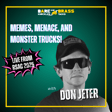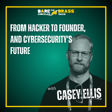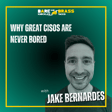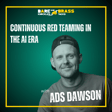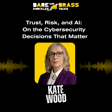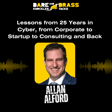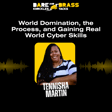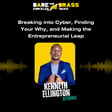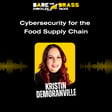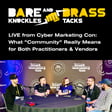Become a Creator today!Start creating today - Share your story with the world!
Start for free
00:00:00
00:00:01

Best Of: Don Jeter, Lauren Palmer, Andrew Owlett, and Michelle Eggers!
As 2024 comes to close, we revisit some of the most listened to episodes in Season 3 so far!
- Don Jeter, CMO at Torq talks about breaking through the noise, and how to stand out in a market full of boring B2B copycats
- Lauren Palmer talks about why Sales is a profession people should be proud of, and how to build teams that don't abuse trust
- Andrew Owlett, global cybersecurity executive, explores how to tell the story of your career and your skills
- Michelle Eggers, pentester, talks about how she quickly broke into the industry and found a niche that has her sharing insights on the conference circuit so quickly
————
👊⚡️BECOME A SHOW SUPPORTER
https://ko-fi.com/bareknucklesbrasstacks
For as little as $1 a month, you can support the show and get exclusive member benefits, or send a one-time gift!
Your contribution covers our hosting fees, helps us make cool events and swag, and it lets us know that what we're doing is of value to you.
We appreciate you!
Transcript
Introduction to Bare Knuckles and Brass Tax Podcast
00:00:06
Speaker
This is Bare Knuckles and Brass Tax, the cybersecurity podcast that tackles the human side of the industry.
Season Three Highlights and Future Plans
00:00:13
Speaker
2024 is winding down and we are bringing you a best of episode from the first part here of season three.
00:00:21
Speaker
We're done with new episodes for the year. We will be popping in around the holidays with a few updates. We got a lot of exciting things planned for 2025 and we're already booking and recording guests for those interviews. We're very excited to bring them to you. But now as we wind down the season, we want to give you some highlights from the past few episodes this fall and give you time to catch up and also enjoy the time with your families.
Creative Approaches in Cybersecurity Marketing
00:00:48
Speaker
For now, enjoy these insights from Don Jeter, Lauren Palmer, Andrew Owlet, and Michelle Eggers.
00:00:58
Speaker
Awesome, Don, good to talk to you. Good to meet you, yeah. I got to ask you, man, not to bust your balls right off the bat, but meme-lord or marketer? Like, what exactly are you? Yeah, I think, yeah, I say chief meme officer all the time, chief menace officer. You know, yeah, I think it's all interchangeable on merch. You know, I got my torque chainsaw trucker on. Merch is a big part of the strategy. So all of the above, I think.
00:01:25
Speaker
So I got to ask you then, what actually inspired you to take a chance at being genuinely funny and like kind of awesome about it? Like, how did you how did you defeat the matrix of SAS 2.0 marketing? Because you guys are kind of like the liquid death of cyber. Oh, that was analogy. Yeah, totally. um And yeah, thank thank those are kind words. um So thank you. But I think the alignment from the beginning with our CEO, our founders, and then also the board. like It was a long process for me to join Torque and I was super excited about it, but it was like a year in discussions with our CEO and him exposing me to the board. And from the very beginning, just
00:02:11
Speaker
almost over communicating what the strategy would be and the playbook would be. And this was back in 2022. And I actually referenced you know liquid death as and as a point of inspiration to say the water category is extremely boring. And this is almost a case study in brand and positioning and packaging.
00:02:32
Speaker
and mentioned like when you look at cybersecurity, when you walk RSA floor, when you walk the black hat floor, when you look at websites, a lot of this stuff is pretty similar and it looks the same and it sounds the same. And so there's an opportunity to differentiate through brand, identity and tone. And so I think alignment's the key to to doing this stuff and you need to get by in early because there is risk, no doubt.
00:02:58
Speaker
Yeah. Yeah. So um this is the bare knuckles portion of the show, aka the airing of grievances. So you've begun to allude a little bit to this, but I would like to give you more space to talk about what you see as the state of marketing and cyber and why or how that kind of propels the unorthodox approach that you've taken. Cause I, let me just lay it out as like a preface to this for listeners. Marketing generally in cyber and I refer to the SAS 2.0 era is absolutely boring and uninspiring and everything just seems like a melting pot of the same type of. It's a lot of copycatism.
00:03:38
Speaker
Right. Like I've worked with a lot of startups that sort of look over their shoulder and they're like, well, CrowdStrike is doing this and will want to do that. First of all, you don't have their money. So stop. stop fiing that Good luck. Good luck competing with them on on on certain fronts for sure. Yeah. But also like, yeah, anyway, less of me talking more or of you just want to give you that. But what's the state of marketing as you see it?
00:04:01
Speaker
No, I think that's spot on what you said, George, I think. And I saw a lot of the same things. And this is in a number of different industries. There is a lot of I think, fear around taking chances. um And marketing 101 is about differentiation. And I think we think about differentiation as it relates to product a lot. How is my product better? How is it different? What are the features and functions that make it better and different? And let me highlight those. And for me and coming to Torque and our team,
00:04:37
Speaker
We think marketing and brand can be a key differentiator. And a lot of times, I think startups jump straight to, we have a great product. Let me tell you about the great features. Let me tell you about the great functions. you know And the truth is, is everybody, you know or a lot of people think they have a great product. There are a lot of great products out there. But if you can't get the attention first, if you can't capture that attention, you won't be able to ever get demand.
00:05:05
Speaker
and so we believe brand leads to demand. And to create a brand, you have to do a number of things to get attention and and earn trust of the audience. like And I think that we all are you know on LinkedIn all day and it does all look the same. And so when everything looks the same, it really turns into noise. And so our approach is like, well, how do we stand out? Because we have a great product. We have great features and great functions. But if we can't get attention, we're never going to win.
00:05:35
Speaker
I think sometimes with startups, you can start with the product and start with heavy product marketing over-index on that. And if everybody's doing that, nobody's paying attention. like Again, everybody thinks they have a great product. A lot of great products never make it because they fail to capture attention. And I think that attention piece is so key that we overlook. And when we look at content consumption habits nowadays in our doom scroll culture and just the our attention spans are somehow getting shorter,
00:06:03
Speaker
you really have to work to get attention. And something as simple as, and we do, right? We do white papers, we do case studies, we do the eBooks, we do the, you know, all the things, we do the webinars, but we really think intentionally about the creative packaging. How do we package that up so that it visually looks different and from a to tone perspective, it sounds different so that we can break through some of that noise. um So that's some of the thinking.
00:06:30
Speaker
Yeah. Cause I think the thing about like the RSA boots and stuff like that is it can be powerful in the moment, but it's got to stay with you, right? Like if torque makes an impression on me on the floor and I forget about it when I get back through jet lag and whatever.
00:06:47
Speaker
Okay. That's hard, right? It was a lot of expense for very little return, but you sort of have to like, I think of it as culture jamming. It's what like ad busters used to talk about. It's like, yeah, jam signal. I think the the issue is like a lot of organizations nowadays.
00:07:03
Speaker
are failing to have a captivating narrative. And I think what you're saying, Don, is that there is too much of this product marketing, highly technical, engineering, founder-focused approach, which has its place. But the reality is they're not doing any sort of compelling narrative as to their brand or any reason why people should pay attention to them because we have such a saturated market that you're kind of dealing with a data overload if you're a buyer trying to assess a space.
00:07:30
Speaker
Um, so that's why I think like if if they focus on having like a good story, then the booth at the conference really only becomes an extension of that story. So you can yeah shit or touch it. It's not the booth is not the story itself. And I think, you know, would you see that maybe Companies, if they're going to survive in the next five years, have to modify their marketing-based approach into building that narrative and understanding what is their subjective narrative to to know their themselves or themselves, I should say.
00:08:06
Speaker
I think you said that infinitely smarter than I could ever articulate. But yes, I think messaging and positioning is the foundation of the brand. And for our listeners, I first reached out to Don because I saw Torx Gertner campaign that is spelled G E R T N E R, which I thought was absolutely brilliant. um Got a lot of laughs from a lot of folks on on my side who have some pretty hard feelings about the analysts firms of the world. So we're going to take a quick moment here and listen to that ad, and then we'll come back and ask a few questions.
00:08:49
Speaker
Hey, I'm Joel Gertner, former professional wrestling analyst. Well, well, well. and I'm here to tell you I've named Torque, the leader in the security hyper automation, Mystical Quartum.
00:09:11
Speaker
Using the Gertner campaign as kind of a proxy to explore your thinking, Don, I have a two-part question. So you talked a little bit about how you got the buy-in internally. So I'd love to know how the team came to this idea. like What are the conditions that allowed the creativity to to really think outside the box and go after one of the sacred idols in cyber, which is the analyst firms?
00:09:45
Speaker
So again, there's a lot of this where it's like, I'd love to say there's this really, you know, strategic thinking that occurs and we plan this stuff out. It was really, again, very organic.
00:09:58
Speaker
um I saw an ad years ago that where the company put on like, Michael Jordan loves our cereal or something. And it was Michael Jordan from Kentucky or like Michael Jordan film. Oh yes. yeah you know And there was a great ad campaign and I always like, I have like a, just a huge folder of like inspiration of stuff I've just really liked. And I think,
00:10:26
Speaker
I'd always wanted to do something with that. And so I started looking on the internet, just ran searching at that size. And I ended up on Cameo and typed in Gartner, because I was trying to find a ah famous Gartner that wasn't Gartner. And then Gartner popped up and it was like, this is meant to be.
00:10:46
Speaker
and he's And he's a wrestling analyst. like there's some Sometimes things happen where you're just like, the doors open so perfectly and you're like, this is divine you know intervention for b toner b two b yeah for a B2B marketer. The total overlap was perfect. It's insane. It's perfect. and then so I grabbed like a couple of members from the team was like, here's the idea. I'm just going to pitch you guys really quick. I want to get this guy to do it. And they were like, duh, this is, yes, let's do this. And we reached out to him and he was great. He was like, I'm in, I love this. I don't know your industry at all.
00:11:23
Speaker
but And the fact that he was an analyst for wrestling, it's just like, again, it was just perfect. And he's been so great to work with. But I think one of the things kind of what we were talking about previously about LinkedIn is this endless feed of the same content over and over and over. And it's like white paper, attend this webinar, come to this event, you know, same thing. And we do that, right? I don't want to discount that stuff because it's important. But we think a lot about the creative rapper of that. And then sometimes it's like, well,
00:11:51
Speaker
Let's just make content that we like to. And it doesn't have to have a CTA. And it's just got to be almost some observation about the industry. And you know hopefully our audience likes it because a big goal of ours is to entertain. I think that that's something that you know consumer brands do really well. But it hasn't really, you know I don't think a lot of B2B companies are thinking that way. But for us, it's let's go entertain because our audience will grow.
00:12:18
Speaker
And that growth of audience will extend our reach and people like buying from people. And so if we create content our internal reps like to share, and we don't ask, right? We don't say, go smash the repost button. Once we get this up, it's like, let's measure based on what our internal audiences say about it. And then hopefully if it's good, the whole industry will like it. But they you know for us, it's like, let's just make stuff we like.
Reimagining Sales: Pride and Authenticity
00:12:45
Speaker
In my role now, you know I don't always go in thick and fast about product. I talk about industry trends and what's going on in the market. and Ultimately, that does come from being able to hold yourself well in a presenting setting and consistently add value to clients. so Lots of different areas that that drove me to sales, but certainly an area I feel very, very comfortable in and a profession I'm really proud of actually.
00:13:12
Speaker
No, we don't hear that often, so good on you. Exactly. Yeah. so So this is the bare knuckles portion of the show, which tends to be the airing of grievances. um You brought up dog eat dog, this notion of aggression, trying to dispel that. I wonder if you could talk a little bit about why you think sales has a quote unquote bad rep.
00:13:39
Speaker
I mean, I know why I think it does. And I was on the marketing side and and certainly George has his opinions, but to hear it from a sales leader and somebody who is also trying to actively change that perception, I think that would be valuable for our audience. Absolutely. And one of my missions and my goals is for more people to stand loud and proud about sales being, in my opinion, one of the greatest professions in the world. It's super rewarding as well.
00:14:07
Speaker
And ultimately, sales makes the world go round, right? Revenue generators are the reason that companies can scale, that we can offer more jobs, that economies can scale. um You know, without revenue, without sales, companies simply can't operate. But what I hate is that there's still in this industry, this like overt stereotype of this typical sales professional. And really, I mentioned a few of those words, like aggressive and assertive.
00:14:37
Speaker
maybe even words like dishonest. um I think there is often these associations of a really highly masculine environment. So kind of in a way sort of conjuring up those Wall Street vibes and the old boys clubs. And, you know, like I said at the beginning, when you actually boil down what sales is, it's an extremely giving profession. It's it's all about assisting buyers and it's all about helping them solve problems and needs. So it's it's definitely a giving back profession where you really want to understand your buyer's world, the issues, the challenges that you're facing. How I see myself is like a sophisticated consultant. Let's position ourselves in a different way.
00:15:23
Speaker
I'm not trying to sell you something that I don't think is of value to your business. I'm trying to help you solve a problem. I'm trying to continue to be a valuable asset for your business and bring in things like expertise and knowledge and creativity to help support outcomes for that particular buyer. So I guess in a way like why do I think it's still happening? I i genuinely think that there is ah bit of a systemic cultural issue in the way that sales teams are targeted in these like high pressure environments you know that demand delivery on these really high revenue targets week after week. and The way that maybe they're trained is this kind of
00:16:06
Speaker
constant, appeasing shareholder value. and I do think it comes from the top. I do think that um it's how you are trained as a team and and how you're executing on being a high-performing sales team that ultimately will translate into the support that you give your customers. I think that you know businesses in a way, they're so hell-bent on scaling fast.
00:16:34
Speaker
um so what I've often seen in my career is that sales teams can be just trained on these like high volume plays. It's all about spray and pray. It's driving as much outreach as possible. It's closing so many deals as fast as they can. And I think as well, you know, it's sales can be a very um financially rewarding job as well. and But I think that can come with negatives too, where you're put in a position and there's this expectation that you have to deliver quickly and fast. um And actually that's not going to drive the most success for a business. So I think there's ah there's a lot of work to be done in that space, both from a leadership level and from a ah culture standpoint as well. You talked a little bit about sales as a giving profession, which is definitely the first time we've ever heard that on this podcast.
00:17:21
Speaker
and So I was wondering if you could talk a little bit about being vulnerable from the sales side, right maybe a contrast to the Wolf of Wall Street bravado and you know posturing of Uber confidence. like Where does that play in either the sales talent that you're recruiting or how you're managing your sales teams or even in interactions during a sales process? Like what what is the power there of of sellers being vulnerable?
00:17:59
Speaker
shit and i um Because I think it it ties back to people buying from people. um And vulnerability and being authentic and honest and operating with integrity is fundamental to being a successful partner. um I've absolutely always acted with vulnerability right the way down to, you know, if my customer says that they want to run a campaign in a specific way, but I know that's not
00:18:32
Speaker
not what I'd recommend or potentially that's not something our business can do. um I will always be honest and either challenge them. I think um you know getting trying to challenge your clients to think differently, maybe trying to unpick a little bit about why they think that's the right approach um or just being absolutely brutally honest that we're not the right business for you. And I must say that we do that a fair amount where some of our customers have these dreams of what they want to achieve. and and In practice, they're super difficult. I work in in digital marketing. They're super difficult to execute. and We'd much rather say no now, suggest an alternative, and even if they say no,
00:19:20
Speaker
i It's highly likely, and it's happened to me multiple times in my career, where they come back because that difficult execution they've then had to live through and they've realized that perhaps there is an alternative and a different solution for them out there. so It's interesting the because it it It actually like hurts my heart when you say it's the first time we've heard sales as a giving professional on the call because all I feel I do day in and day out is help people. I will keep on top of what's going on in the market. I will send through interesting articles of relevance. I will think about a strategy. I will work with my clients who are
00:20:05
Speaker
Marketers are big tech companies, big cyber security companies. Those are our largest clients. I'll understand how are they being how are they being measured in terms of their performance? What are their KPIs? What are their metrics? What are their biggest challenges?
00:20:21
Speaker
And my job is to listen, to take that away and to come back with ways that I can help them, is to be really creative and proactive with with ideas. So yeah, it pains me to think that people don't see it like that because there's just so much that goes on behind building a really, really successful partnership.
00:20:43
Speaker
Yeah, that is, uh, that's pretty much the best answer we've ever heard. so Yes. I want to build an army of people who have the same goal as me, which is to change the perception of a salesperson.
00:21:01
Speaker
um um Hey listeners, if you like what we do, the snark, the stories, and the big swings we take, we'd appreciate your support. With the link in the show notes, you can become an official supporter of the show. You can send us a one-time gift or sign up as a member to provide ongoing support. Memberships start for as little as $1 per month. Each membership tier comes with a unique set of benefits, including exclusive discounts to the BKBT swag shop. So really, for less than you'd pay for one cup of coffee per month, you can support the show. Use the link in the show notes. It covers our hosting fees, helps us make cool swag, and it lets us know that what we're doing is of value to you.
00:21:48
Speaker
Many thanks to recent supporters, Jessica, Jason, and Maria. We'd love to have yours, too. are All right, we're back.
Cross-Functional Skills for Career Growth
00:21:59
Speaker
Andrew, I had a different question for this portion, but then in the last section, you said, like, my favorite thing, which is cross-functional skills.
00:22:09
Speaker
Right. You know, George has also spoken a lot about how he hires and how he sees his team is like he's a high performance athletics coach where you're trying to get the most out of people. But he's also talked about the ability to communicate and put team members in roles where they have to take some ownership responsibility. I think that cross-functional skills are like the most important because I see a lot of people who get more or less pigeonholed or railroaded, depending on how you look at it, into like a lead technical role. And they are deprived of the opportunity of getting up into management because they are basically seen as the propeller head who's like so technical that the organization can't afford to lose them there. But maybe it's also because they didn't demonstrate the skills to like communicate to people who aren't as technical.
00:23:00
Speaker
Anyway, you said stuff out like being able to see around corners. and So my question for you as a brass tacks for our audience is what are you looking for? Can you define that a little bit more?
00:23:15
Speaker
And then how should our listeners like try to cultivate those skills? If they're listening, let's say they're like, maybe they're in a senior manager role or a senior analyst role and there's, and you know, they want to get there, but they're now they're hearing this term cross functional skills. How are they going to, how are they going to go get that?
00:23:33
Speaker
Yeah, and i before I answer that, I'm not trying to deflect, but it's interesting. like um Lead technical person like wanting to get to manager or capable to get to manager, her that's a whole other topic. right like Being a manager and then being an individual contributor, like there's different pathways. and um One isn't better than the other. like You can still be a leader as an individual contributor. You have to lead through influence. You have to lead through different methods and everything. but and You may not have any direct like people to to manage, but indirectly, you have to manage projects, programs, and stuff like that. so It's super, super important. and you know like like ah On the managerial side, i mean it's super important as well. like You got to lead teams and you have that authority. but
00:24:20
Speaker
I wanted to make a point that like just because you don't have that authority doesn't diminish like your role. right like If you want to get into leadership and you believe you have the skills to get into leadership, then do it. But if you want to remain technical in an individual contributor, that's totally cool. like Do it. like Be the best distinguished engineer out there. like Just industry terminology right like or whatever. like Lead technical architect, whatever it is. so um But cross-functional skills. So when I think of cross-functional skills, I think of um being able to manage a project, um which I would say that if you're a senior manager or a manager, that you're managing multiple projects on your team, like your team is executing on them. If you're an individual contributor, you are going down the path of us of a goal to accomplish. And that goal has dependencies. It has deadlines.
00:25:16
Speaker
That is a project that has a cost to it. It has resourcing constraints. like Fundamentally, like you are working on a project. So like project management as a cross-functional skill is super beneficial for a number of reasons. You have to know how to communicate with people. You have to know how to listen. like Those are soft skills that will carry you in quite literally any role.
00:25:41
Speaker
Like any role you can, you know, go be whatever you want when you grow up. And a personal note to the listeners, you know, Andrew was helping me after a layoff because he used to run a side hustle as a career consultant. um But it was that resume template that you gave me that really made me rethink about how we typically talk.
00:26:02
Speaker
Also, typically, the resume is like, here is the position and here's all the stuff I did. It's like roles and responsibilities, but what it reads like is a task list. It doesn't actually communicate skills developed or honed over time. Anyway, that was ah that was an eye opener for me. so it Really quick, by the way, George, like what you started with?
00:26:26
Speaker
And like what you told me was really, really solid stuff. It was just crafting the story to your point, like the story of who is George and what is his like killer strength that we need in this organization. And like,
00:26:44
Speaker
Once you start reading that you start believing it and then you start acting like it and it completely changes the dynamic of even an interview and then the role that you're about to take on. It it changed it what I was looking for it changed how I talked about myself in interviews it changed even the roles that I was looking for yeah it was incredible.
00:27:05
Speaker
I actually do have a question. What I want to ask you about was advice for brand building for the specific purpose of acquiring a new job. This is like a season one question for our show. Building a brand specifically to acquire a new job. Oh, man. um So I have um a weird like view on branding.
00:27:26
Speaker
um because I've built a brand silently, and then I built a brand loudly. like and i'm not ah I don't like being a loud person.
00:27:38
Speaker
like scratch that. I don't mind being a loud person for the right things. like So I'm very intentional about like what those things are, but I don't want to be loud to just be loud, if that makes sense. like It just isn't me. um but So I've done things both ways. yeah I mean, there's a lot of people being loud to just be loud and everything out there in the industry. so And ah they they do it the wrong way. and you know Anyway.
00:28:08
Speaker
um But I i built a brand both ways, and I think a lot of it has to do with confidence and also like time commitment. right like It's kind of a little bit of both. like it takes It takes effort to build a brand, so you have to invest some time. um it It can eventually happen organically, but when you're first starting out, like you have to like kind of like have some foresight into who you want to be, who you are and who you want to be as silly as that is. So who are you today? Like are you technical or are you not technical? Are you just out of college? Did you not go to college? Because that's cool too. Like you don't have to do that. Like um but so like figure out like who you are and then
00:28:56
Speaker
Where do you want to be in a couple of years and then once you figure that out you start like networking Intentionally and that that was a lot of my silent branding and not loud branding was networking and shooting people messages and being like hey look I'm new and I'm just trying to figure out what my pathway and security is like do you have a couple minutes for a coffee chat like 15 20 minutes like um So building my brand that way through personal connections and then on the flip side like Right now, I'm building my brand a little bit more loudly. I'm going to more industry events. I'm posting more on LinkedIn um about my story just to see if it's like helpful for anybody else. um but That took years to get there. like I wasn't comfortable doing that until the last year. and Then it took like time to think about like like what intentional message am I trying to put out there and for whom.
00:29:51
Speaker
So I started thinking about that audience piece too. um So anyway, my advice for people is honestly start start small. Start really small with intentional networking. like Once you figure out where you want to be in the next couple of years, start going to LinkedIn and looking a people in the industry or in a parallel industry and just meet people like you don't have to go out there and post all the time and like do all this stuff like you don't have to comment every day like sure that and may help eventually and you may not need to do it every day but like don't don't jump into it and start thinking like you're gonna post every day and like do all this stuff so that's my like take
00:30:37
Speaker
did the bootcamp, did all these additional trainings, fired out, you know, hundreds of resumes, did like 40-ish interviews over the course of maybe five months. Like I just hit it super hard until um something landed and what landed was the best fit I could have, I couldn't have even
Overcoming Challenges in New Roles
00:30:56
Speaker
imagined. You know, I love pen testing so much and it's like exactly my personality type.
00:31:02
Speaker
um So I feel like I know I put a ton of work into it to get to where I'm at But it's still I still feel so lucky that I landed where I did Yeah, and I remember when you first landed at your gig. It was kind of provisional probationary, like you had to like still you got in the door and you still had to earn stripes, right? yeah Before you got like full time. Yeah. Yeah. It's crazy. So even my training cohort was, um, somewhat experimental and they were trying a new approach where it was a little more hands off. They still had like instructors dedicated trying to help us succeed, but um it was a condensed timeline. And it just really was like the proverbial fire hose of information. And half of my cohort didn't make it, which is really sad because we got really tight. We were trauma bonded.
00:31:54
Speaker
um
00:31:58
Speaker
I mean, truth, truth. yeah Yeah. Yeah. The attrition was high though. Um, but I managed to survive and, um, I even pivoted from that initial survival into a niche with mainframe. So that's been pretty sick. Do you, before I asked another question, do you have a sense of like why some of them didn't make it? Like what is the, the litmus test there? Do you have a sense of that? Yeah. Um, gosh.
00:32:30
Speaker
It's hard to say, but I think part of it was attitude. um Because you can't just have strong technical skills. You still have to be able to perform a readout, for example, or have positive internal communication. So that could be part of it. um There may have been some cheating, I'm not sure. So it's possible on our last test that we were doing. um And then, let's see what else could have been it.
00:32:58
Speaker
I know someone was let go later because they weren't actually doing their testing. It can be because the supervision is so low with what I do. I mean, you can really be extremely lazy and you won't get caught for a while, which is a little scary to think about because of what we're being trusted to do. um But you will eventually get found out and they will cut you at my job. They don't like to carry head weight.
00:33:22
Speaker
um I mean, who does who does? I mean, I'll just make one more comment and then we'll pass it over to George. ah I what stood out to me there in your journey is one, you treated the finding a job like a job, which is something I say all the time. Like you had a system and, you know, went after it hard, but also. You talked about.
00:33:44
Speaker
getting anything that you could put on the resume from a skill side. You said CTFs, you said labs, you said, what you, I didn't hear you say is like chasing certs, chasing, you know, like really long expensive courses. And I don't know, it stood out to me because ah my co-host here has often talked about like, I would rather see curiosity and skills than a whole bunch of certs because that just tells me you know how to take a test.
00:34:11
Speaker
um but yeah over to you george What I hear from your story is that you set your mark on a goal and you put in the work necessary to achieve the goal regardless of challenges and you just work through every hurdle one one jump at a time.
00:34:27
Speaker
And, you know, not to be a bit of a hard ass, but the the longer I stay as a CISO, the more hardened I get to kind of the situation of people complaining. And so I don't think there's like necessarily a staffing crisis. I think there is.
00:34:42
Speaker
There is an entitlement and a lot of people who have the dream of the big figure cyber job and they don't want to put in the work and learn the valued skills necessary to one, land a position and two, enable themselves to to accelerate their careers. They want things handed to them and they complain when it's not handed to them.
00:35:02
Speaker
You, my friend, are an example of someone with blue collar work ethic who did it, who achieved it. This is the kind of story that I think we should be platforming, and should be talking about. For a lot of people who are thinking about getting into the industry or going through the struggles of like, hey, I can't find a job, what do I do? And then they go on and complain about how there's no jobs available and LinkedIn is garbage. And indeed, is because they are garbage, like the job posting game is garbage.
00:35:27
Speaker
But you demonstrated value. You demonstrated value, you were personable, you endeared yourself to people, and you got an opportunity. And when you went through a training course, yeah, crazy shit happened. It reminds me of being in the Army. When I was in the Army, there was a massive cohort when I started all my courses. And by the end, it went away to about one-third because of the same shit. Some people didn't do work. Some people were lazy. Some people just weren't good enough.
00:35:52
Speaker
I think what I want to say and I want to ask you about is, where did you find the strength to dig deep when you hit those walls? Because I think that's the core of what what your story is is. You hit a wall and you don't just like get the scourge. You're like, cool, can I get around this? Can I jump over this? Can I jump through this? Like, where did you like a pen tester?
00:36:13
Speaker
Like a bend, actually. Where did you find that kind of intangible skill set to overcome the challenge? I think that's what listeners want to know is how do I get through it when it just seems like it's impossible to cross? um A couple things come to mind.
00:36:30
Speaker
And one is having some kind of a support network, people to commiserate with, people who are beyond where you are currently at who can say, you're so close. Don't quit. It's just around the corner. um And so having a nice variety of people who are really just want to see you win, and they're cheering you along, regardless of where you at or the setbacks you have. um And then you say, I don't get discouraged. I got discouraged a lot.
00:36:57
Speaker
Oh, it was hard. It was really challenging. but I didn't stop. It's like I still encountered imposter syndrome and fears and horrible anxiety before interviews, all all the things that can happen to a person. I wasn't i didn't go into it with this superhero um ability to just withstand everything that came my way. It was it was hard. um But the other thing, aside from having the support network, is knowing that you can do it. And that's just something you have to have from your life and from other challenges maybe you faced and gone through as you've
00:37:37
Speaker
just taking your journey ah as a human on this planet. and You have to decide that it's something that you can achieve. And then if it's something you genuinely want, you will get there. And maybe it won't look exactly the way you had imagined it would look. um But in my case, it's even better. So let's talk about advice to the up and comers who also feel like they want to give talks or they want to do what you've done.
Conclusion and Call to Action
00:38:07
Speaker
What is your advice to them? Do it scared. Do it scared. I am terrified leading up to a talk. I put a lot of effort in. I do my research. I prepare. I practice. And I'm still scared before I get up there every time. But i so I love doing it too. There's a balance there. It's not just this pure fear response. I'm excited too. But it's hard. It's
00:38:35
Speaker
It's not easy, especially when you're newer in the field. And I'm up here and I know there are there are people in the audience who've been doing pen testing or working with mainframe or even just IT stuff for decades, actual decades. And I'm, you know, on my a couple of years in a history leaning back on the things I've learned, but I have to remind myself, okay, just because they've been doing something for a long time doesn't mean they know what I know. They don't do what I do. I can still show them and teach them what I have discovered in my experience that they don't have, they don't have that experience.
00:39:11
Speaker
so you know, all the different lengths of career aside, it it doesn't matter if you have something to share and you probably do just share it, do it scared.
00:39:27
Speaker
If you liked what you heard, be sure to share it with friends and subscribe wherever you get your podcasts for a weekly ballistic payload of snark, insights, and laughs. New episodes of Bare Knuckles and Brass Tax drop every Monday. If you're already subscribed, thank you for your support and your swagger. We'll catch you next week, but until then, stay real.
